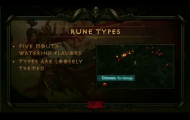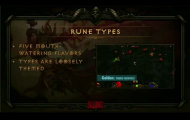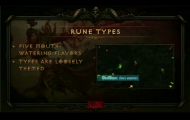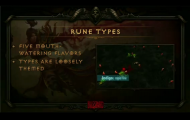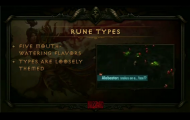Gameplay Panel Blizzcon 2010
This is a transcript of the Gameplay Panel held at Blizzcon 2010 discussing the newly revealed Demon Hunter and changes made to the other four classes during the year.
The remit read "How does the Diablo III team go about creating a class fit to fight the legions of the Burning Hells? The designers and artists delve into the creative process." c
On the panel was:
Jay Wilson - Game Director
Kevin Martens - Lead Content Designer
Christian Lichtner - Art Director
Julian Love - Lead Technical Artist
Wyatt Cheng - Technical Game Designer
Leonard Boyarsky - Lead World Designer
Paul Warzecha - Lead Character Artist.
Jay Wilson - Game Director

We really felt this character fit the Diablo universe. We wanted a very dark character, an almost obsessed anti-hero. We really liked the idea of a Bounty Hunter. That was a lot of the drive for what we wanted. We wanted a character that felt like this is somebody who hunts down the enemy.
We always look for a way to do more fantastical stuff with a character. The Diablo 3 classes are very showy at times. Here we have Shadow Magic. Shadow Magic is really kicking into the idea that she really likes to dabble in anything she can to make her more effective in hunting down the enemy so she's not adverse to using dark magic or "Hey, I found out if you take the spleen of this demon and carve out it down into a bow the arrows actually go 20% faster. She knows every trick. She knows more about Demons that anyone in the Diablo universe.
Christian Lichtner - Art Director
That was a good starting point. We really liked stuff. We said to ourselves that it still read a little bit on the swifter side and also a little bit more deadly so we added a bit more of an edge to the character but that still wasn't where we wanted the character to be.
As we iterated on this we added even more of that. We added cowls and a lot of different elements like that. As you can see our products take a lot of development and one of the things we started to realise as we went through all these concepts was that it really didn't start to read Ranged any more, it started reading more and more like an assassin, a little bit like a melee class and so at that point we said to ourselves that we need to take a break. We need to slow down, rethink what we are doing.
So, how do you make a Demon Hunter? First off we started off with the craziest thing we could think of and thought what if it was a Demonic Demon Hunter? What if it was a demon hunting demons and as you can see here (left) a concept of a fully-blown demon. We really liked this concept, we thought it was a lot of fun. It only had two problems with it. One of them was, in the Diablo universe, our heroes really have to be human, they are pitted against hordes of hell and having a hero that was demonic would be a problem. Also there was a problem as far as designing gameplay around a changeling or a shape shifting class so we went back a thought about making him part demon. In this particular concept you see a very large Demon Hunter and he has a demonic arm. One of the issues we had at that point we were worried about the fact that if this guys walks into town trying to sell his wares or try to buy something maybe the townspeople wouldn't quite go along with it once hey see the demon arm. Also the size and bulkiness of him really felt very strong and we weren't sure if it felt ranged or fast, swift and agile as we were hoping for. The arm implies melee because it's so thick and strong.
We changed all those things at that point. We went a slicker, more agile. We went with a design that only had armour up until the ribcage and below the ribcage it's very light and leathery. We also decided to go with dual crossbows because we thought that would be really cool. We were still holding onto the demon arm, we thought maybe we could pull it off but what we started to find was that when people were playing it they really wanted to hit things with the demon arm. They felt like it was something they really wanted to use so at some point we had to say goodbye to it. It also messed with the human part so last but not least we ended up with this design. It's very close to the previous one. As you can see it has a cowl. It's a little bit more on the dark side and a little mysterious. It still moves very fast and swift and we wanted to make sure it had a dark vibe and it really read very anti-heroish in that sense and also with that medieval vibe that we were talking about of course, most importantly, that it read ranged!
Paul Warzecha - Lead Character Artist
So, she hit the ranged archetype obviously but we also wanted to have a character that has a much darker because, like Christian said, you've got a Holy Monk, a flamboyant Wizard and, honestly, she just looked plain cool at this point. So it's time we start asking ourselves how we gear this character up, how do you upgrade a cowl. We got to start thinking how do they caps work and we start to think what makes this character visually distinct from the rest of the classes so the character team keyed in on three big things. Number one the character has a scarf. When you are running with the Demon Hunter, out the corner of you eye you might see that character's that just a little way away from the crowd, she's got this flowing cloth and right away you know that the Demon Hunter is there. From game cam you are also going to be able to see this character's legs unlike the wizard and the monk. We also keyed into this arm guard which helps her silhouette 'pop' a bit more.
So a character like this is very strappy, she's kind of gadgety, you can see there's a lot of stuff going on but when you zoom out to 30 feet above her head you want to be able to see that stuff and read the character so we grouped together and colours and values and that sort of thing.
At this point we have a model we are happy with and the animators are going to take that and start filling out her animation suite with all the cool things that a Demon Hunter does and start putting together some of her tools. Obviously she's going to use bows and crossbows, she's also the only character who can dual wieldPistol Crossbows. You can see the fruits of everyone's labour. We've got a character that really takes advantage of her pose to pose action. Pulling a trigger is probably not as exciting as swinging an axe of a sword but they really reinforce her character by just the full body poses that she takes when she shoots stuff and also taking advantage of her skills.
Leonard Boyarsky - Lead World Designer
I'm going to take you through the lore of the Demon Hunter and talk about her background.
If you take the best aspects of a Ranger and a Bounty Hunter class and combine it with an epic revenge quest you end up with a really excellent challenging class to play and on top of that they dual wield crossbows, I mean what more do you need than that?
So what drives the Demon Hunters? They are an obsessed hero, she will do whatever it takes to hunt down demons and eradicate them from the world of Sanctuary. We took her partially indo the demon world and we wanted to show that she dabbles in the dark side, she is not afraid to get her hands dirty. We didn't want her to seem demonic so we didn't want to go into her having demonic parts or the demon arm, so we pulled back on that and we gave her the glowing eyes to show that she's been messing in areas that maybe she shouldn't have been.
Wyatt Cheng - Technical Game Designer
Now that we've established that the Demon Hunter is primarily about ranged, shadow, gadgets and traps. We need some skills that are going to bring that to life. We want skills that sell those three concepts. So the first skill we are going to talk about some of her skills.
Bola Shot
This mixes two themes, ranged and gadgets. She shoots out a bola which wraps around the target and explodes. It feels really tactical, it has a slight delay that you can use to your advantage in the right situations.
Vault
This a movement skill. The Barbarian has Leap Attack, the Wizard has Teleport and we wanted to make sure all our classes had a way to get around the battlefield. In this skill we wanted to sell the Shadow theme. Initially we talked about Shadow Vault and stuff like that, but we decided to just call it Vault and let the art peak for itself. There's no need to have to weave these concepts into every single skill. The artistic representation has some acrobatics and has some shadow themes to it. It's basically a way to take a solid mechanic and wrap it up with the aesthetic we are trying to sell and deliver something we think will be fun for the players.
Spike Trap
One of her themes is going to be traps and gadgets. This is not unlike some of the Assassin gameplay you might have seen in Diablo 2. In this case we want to sell again the shadow theme and the gadgets theme. We just take an ordinary trap spell, weave in some Shadow themes and the art kind of brings out the flavour, differentiates her from the other characters. Another thing I really like about Spike Trap is it has that sense of preparation. We want the player to know that the Demon Hunter is somebody that goes to sleep at night and dreams about killing demons. She wakes up in the middle of the night and goes "Oh, I have this great idea for a trap that will be awesome for killing demons", goes back to sleep, wakes up and kills a lot of demons. That's her thing.
Also selling the idea of ranged attacks is Grenades. I love this skill in our game because we have a 3D engine so you can actually bounce grenades off the walls and floors. I think it'll be an awesome way for players to come up with some creative uses for grenades, throwing them around corners. It actually bounces around and it shows, again, and it sells the Demon Hunter's themes - ranged attacks, gadgetry, preparation and planning. This is premeditated demon killing going on.
And finally I want to show you guys Multishot. Multishot some of you guys might remember from Diablo 2 but it's been amped up and brought to the next level for Diablo 3. We know that Multishot was a hugely popular skill in Diablo 2 so we wanted to bring back that mechanic that we know, the skill that people love but artify it up for something more appropriate.
Kevin Martens - Lead Content Designer
On the second part of the show we have a lot of new and improved skills and skill systems and other character things to show you. On the new side we are going to show you a complete overhaul of the skill system itself, new class skills for each of the classes, a new trade system and an introduction of the ever elusive Talisman.
So when you have a bunch of skills like Wyatt was showing you the next thing we need to work on is to make them deep and replayable and to make them accessible and on that end let's break down the skill UI from last year and talk about some of the problems we had with it.
So we went to a list approach. With this we were getting a little bit closer. On the left hand side we had all seven of your skills in one place. This was a major improvement for us, you could see your entire character build all in one place and on the right, when you were choosing new skills, it was getting better you could see everything bigger, you could see what you could choose next and you could start thinking ahead by scrolling down the list but it wasn't quite good enough.
Here is the current UI. We kept everything with the seven skills on the left and on the right hand side we made that window a whole lot bigger so you could still plan ahead but you could see all your choices available at one time making the entire skill UI a lot more accessible. At a glance you could see what you could spend.
This became very straight forward, this UI idea that at a glance you know what to do. You look on your left and you can choose a new skill or spend points in your old skills. This was good. If you can see a blinking plus sign that means you can spend points in it, if there's no plus sign that means you've maxed it out. Now a little extra insight into the seven skills. At the beginning of the game every skill that you choose has five skill points that you can put into it but throughout the course of the game you have ways to deepen that and augment the skills so that you can spend more points into them, So, initially, it's much easier to make builds, it's easier to thinking ahead, to respec when you want to do that as well and you can try a lot of things very rapidly. But there's a lot more to the skill system than just this.
Wyatt Cheng - Technical Game Designer
We've also been working on fleshing out and getting new skills for the four classes we had already announced and we want to show you some of those today.
Barbarian
We knew that he needed a ranged attack so here is an example of Ancient Spear. We don't want to turn the Barbarian into a ranged class so this is something that feels very appropriate for him. We want to sell the theme that he's strong, he's tough, he's melee so we had to come up with something that felt appropriate for that.
Wizard
We are going to bring him back another fan favourite, the same way we brought back Multishot, bring back Meteor. Meteor was also a popular skill in Diablo 2. People liked it, we liked the gameplay of it so we brought it back, artified it up and I tell you right when you get some runes in Meteor it's five times the fun.
Witch Doctor
I alluded to it earlier, that we want some movement options for every class and Spirit Walk is the movement skill for the Witch Doctor. We wanted something that stays thematically consistent for every class and in the Witch Doctor's case, he's about spirits and voodoo so in the Spirit Walk ability where he turns incorporeal, he can walk around, through enemies, walk round corners and when Spirit Walk ends he comes back in his physical form that becomes teleported to wherever his Spirit form is when Spirit Walk ended.
Monk
Wave of Light. He summons a mystical bell that he shoots out at range. It's kind of a combination of a melee and ranged attack. One of the things that I really like about this skill is that we need to differentiate the Barbarian from the Monk, they are both melee classes and in his case he's abbot combining mystic arts with martial arts and I like the evocative imagery that happens here. The concept of a mystical bell that he fires off, it's very vivid.
Jay Wilson - Game Director
I'm going to tell you about a new system that we've introduced into Diablo 3 in the last year. It's called Traits.
Here's a Trait example for the Barbarian called Inner Rage. This highlights something really important about Traits, they are not universal to all classes. Every class gets Traits that are unique to them, there are some that carry over that make sense but for the most part they are very unique to the each class.
Here's a Trait example for the Barbarian called Inner Rage. This highlights something really important about Traits, they are not universal to all classes. Every class gets Traits that are unique to them, there are some that carry over that make sense but for the most part they are very unique to the each class. We want to sell the idea that the Barbarian, is not only an angry dude, you probably have figured that out already but he actually gets power through his rage.
Well, why did we decide to do this system. There's a bunch of reasons. The main one is character customisation and those of you who know and love the original Diablo and Diablo 2 know that character customisation is a huge part of the game and if you're new to Diablo that's what it's all about so that was a big focus for us. We used to have a system in Diablo 2 where you could spend attribute points on all your core attributes and this system was much loved as a customisation tool but in actuality when we looked at it most of the builds took the exact same points in the exact same areas even across the classes and so we didn't feel like it was a good customisation system. Traits is really to specifically address the removal of attribute point spending.
One of the last reasons we really wanted to do this was it was always a bad decision to make in the previous skill trees where you knew that a passive skill like "if I take this it gives me more armour", that's a good skill and mathematically it makes sense but maths kind of sucks. If Diablo is the active skill then this guy's passive. I want to spend points in Whirlwind, I don't want to spend points in more armour so by separating the passive skills from the move active active skills which now completely take up the skill system we get a much better decision point.
We don't consider the system done yet, I love to share our process with you. What's on our 'to do' list? Well the UI's not awesome and it's okay for me to say that because I designed it. It's just a grocery list right now and it's not very fun to use. Gaining them (Trait Points) every other level isn't perfect, it may be fine we may ship with that. Right now it feels a little weird like you almost don't know when you Trait Points are going to show up and that doesn't feel awesome. There's probably too many of them. When I talk about making numbers awesome, if you go and play with the Trait system, because it's fully playable on the floor you're going to say, "Hey, I thought he said the numbers were going to be awesome, this just seems like too much decisions or too low in numbers". The truth is you're probably right. We're looking at that now and saying maybe we didn't quite get it right.
Kevin Martens - Lead Content Designer
Before we get into the Tailisman I want to talk about Charms from Diablo 2. The charm system, if you are not familiar with it, was a very simple cost benefit thing. There were these objects that would sit in your inventory, they would take up some of your inventory space but they would give you a wide variety of bonuses. This was good, we liked the concept behind the system and we liked the charms themselves but what it led to was people keeping as many charms as they could and keeping a tiny bit of inventory space and we didn't think that was a great choice to have to make. You couldn't resist taking the charms because it augmented your build so well. How do we solve this? The Talisman is a dedicated inventory for your charms and not only that it gets bigger over time, it keeps all of the advantages of the Diablo charm system. You have more charms that you can fit in there so you still have to pick and choose which ones you're going to have to augment your build.So now that we had a better spot to put your charms we wanted to work on the charms themselves. So how have charms evolved? The bonuses for Charms in Diablo 2 were very varied, incredibly varied, there was almost no kind of bonus they didn't have and in Diablo 3 we are going to have them concentrate on your core attributes so this is very much about customising your build, about augmenting what weaknesses you have and making your strengths better etc. The charms are going to be a core part of your build so they are still very important and there are different tiers of them throughout the game so as you go forward you're going to be playing with your charms a lot. As you choose new skills you'll be choosing different charms to try to make up for the options you chose.
We haven't talked about Runes for quite a while, in fact we gave them the year off last year to let them percolate a little bit but they are back and they are in the game and you can play them here at the show. They are fully implemented in the Witch Doctor, the Wizard and Barbarian and I urge you to play the game and give Skill Runes a try.
Just a quick update to get you up to speed to where we are with Runes. If you remember Runes are a system for modifying your skills, they drop in the world like gems do but instead of putting them into your items to modify what your items do you put these in your skills and modify what your skills do. Skill Runes are a huge feature for your characters. Usually when we think about customisation people think about things like skin colour or hair style or maybe gear but the skills that you pick for your character are a huge part of your character customisation.
That's a really big number and hard to wrap your head around so let me try to clarify what we are talking about. This is the number of skill combinations with runes that you can have per class, this does not include things like traits, gear, dyes, charms, this is purely active skills. You are really going to be able to come up with a tonne of different kinds of class combinations. It's not just about numbers skill runes are going to be able to provide a whole lot more and one of the key things to keep in mind here is that skill runes don't just change what a skill does they have the potential to change the way it looks.
We still have five times the skill Runes only they have now changed their names. They are now called Crimson, Indigo, Obsidian, Golden, Alabaster. We had a system before where we named the runes according to the concept attached to them like Multistrike or Energy and Multistrike Runes did Multistrike things and Energy Runes did stuff with your resources. What we found was that we kept coming up with ideas that didn't fit with those concepts very well. At first we would have some concepts that would fit really well, we'd get some things that did a multishot and they would fit but when you started coming up with wacky ideas it became harder to shoehorn them into that system.
To give you an example here. The Witch Doctor's new skill called Poison Dart and that kind of fit with the Power Rune before but then we changed the skill so we had another version that would make it a rapid-fire skill and then it worked really well with Multistrike but then we had this wacky idea of the Witch Doctor being able to shoot a live snake that would attach itself to monster's faces and stun them. Where does that fit? It doesn't fit anywhere so we just changed the names of the runes then we can come up with as many kinds of wacky ideas as we want.





























